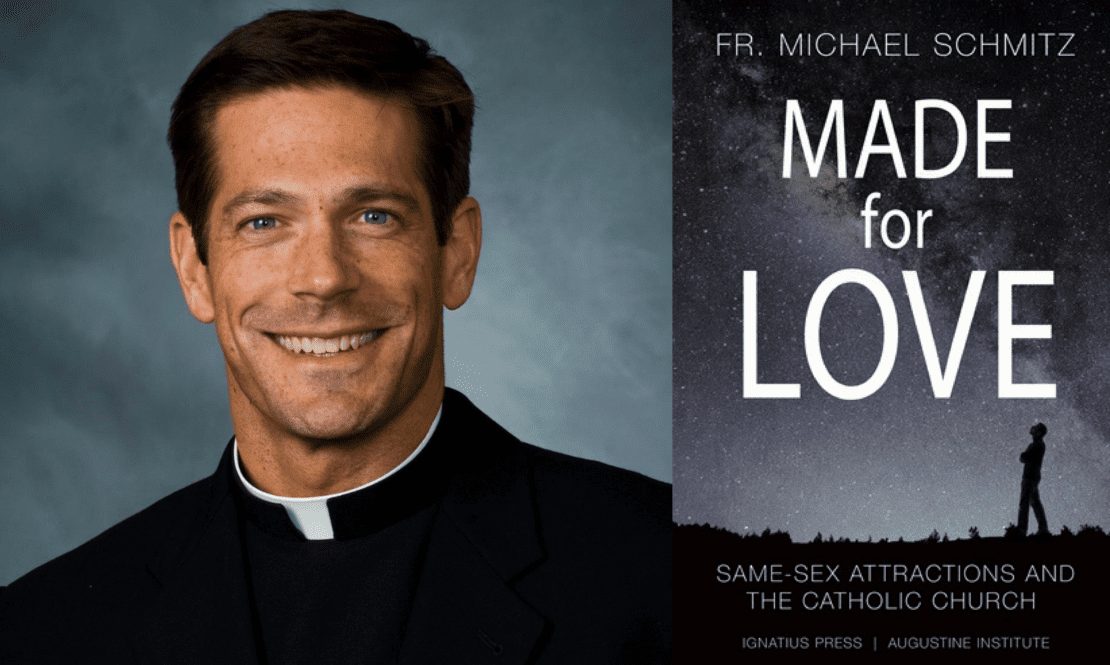Exclusive: Fr. Mike Schmitz on new book for young Catholics with same-sex attraction
The young Catholics to whom Fr. Mike Schmitz ministers love Christ and are faithful to his Church, yet for many of them, the struggle to understand the Church’s teaching on homosexuality is real.
In his new book, Made for Love: Same-Sex Attraction and the Catholic Church, Fr. Schmitz set out to confront this dilemma by presenting the Church’s teaching on this subject in a way that is relatable to the young people of today.
“One of the things that I’d found was that there were incredibly faithful young people,” Fr. Schmitz told T&L. “They loved Jesus and they loved the Church. And yet, when it came to the Church’s teaching, or their perception at least of the Church’s teaching, when it comes to same-sex attraction, it was like: yeah, I’m out. I’m done. I’m not going any further with that.”
“And I thought: That’s so interesting, and tragic.”
Published in November 2017, Made for Love aims to reach young men and women who experience same-sex attraction and their loved ones. Fr. Philip Bochanski, executive director for Courage International, wrote the forward.
Made for Love came about when Ignatius Press approached Fr. Schmitz, a priest of the Duluth diocese, to write the book after they heard his presentation to young people, “From love, by love, for love,” which had been published by Lighthouse Catholic Media.
The talk stemmed from his experience working with young adults, many of whom continued to be confused about the Church’s teaching on homosexuality.
This experience revealed a need to respond to what seemed to be “a degree of misunderstanding, or a degree of lack of clarity or lack of charity”, he said.
The objective of the book, therefore, was to “bridge a gap.”
Based on his experience in ministry, as well as his relationships with family and friends, Fr. Schmitz felt the best approach was not simply to “pick apart every possible theological objection to the Church’s position,” whether speaking to persons who experience SSA or their loved ones.
Rather, his goal was to “present the Church’s teaching as it relates to the issue of same-sex attraction in a way that says: Okay, this makes sense… Here’s how I can relate. Here’s how I can help.”
“This has to be for people who are of good will” who “want to understand this, not just kind of in a theological, philosophical way, but from a heart perspective, and from a ‘how do I follow Jesus’ perspective.”
Fr. Schmitz’s approach to ministry on this topic has been largely shaped by his personal relationships with persons who experience SSA, in particular his younger brother.
Amid “all of my theological training, all of my prayer, as it regards this issue, and people’s lives and people’s hearts, it all had a personal face to it,” he said, adding: “It all had his face to it, more than anyone in the world.”
Homosexuality “was never a topic for me,” he explained. “It was always undergirded and thoroughly imbued with a person’s face. And a person’s heart. And a person’s whole experience.”
“There was something really that was necessary that the Lord had been doing in my heart as regard[ed] same-sex attraction,” he added.
The reason God placed persons in his life with this experience, he believes, “was to always give me the real clear sense that this issue is always more than an ‘issue.’ It’s as multifaceted as the people who experience it.”
Confusion over one’s sexuality (compounded by today’s hyper-sexualized culture), as well as a fear of loneliness, are among the challenges which Fr. Schmitz faces in his ministry.
“One of the big challenges we have is the hyper-sexualization of our culture,” he said. This becomes pronounced during adolescence and young adulthood, and especially “when it comes to recognizing physical beauty, recognizing the attractiveness of others.”
As a result, he finds that young people often draw conclusions about themselves “based off of some kind of attraction.”
For instance, a young man might say: “I was reading through a sports magazine, and there was a man who had a healthy body, an athletic body, and I found myself being aroused for a moment, and I was like: wait a second, what does that mean about me?”
Such an experience might simply indicate that this young man recognizes strength and beauty, Fr. Schmitz explained. However, “because we’re so trained to sexualize that, that becomes another obstacle.”
In situations where the SSA appears to be persistent, he said, another challenge involves the fear of loneliness: namely the belief that “there’s no one out there who is pursuing Jesus, living a life of chastity, and is happy.”
Here he expressed the importance of the work of Courage International, in that it shows how persons who pursue chastity are not doomed to lifelong loneliness, but are able to find true happiness in chaste friendships.
“Courage is kind of a secret in the world of the Church,” he said. “If more people knew of it, I think that so many more people would have the strength and the courage – for lack of a better term – to say: Okay, this is actually a real possibility.”
“I think sometimes we can see our cross as a death sentence,” whatever that cross might be, he said. As a result, many persons who experience SSA believe that their options are to be miserable and maybe go to Heaven, or be happy and go to Hell.
These, of course, aren’t the only options, he stressed. “There’s more, so much more that the Lord wants for you than just be miserable and go to Heaven, or indulge and go to Hell.”
Fr. Schmitz explained how Made for Love explores the notion of a “deeper understanding of acceptance,” beginning “with self-acceptance.”
He cited Fr. Romano Guardini’s reflections on the first step of the spiritual life. “If we want to have any growth in the spiritual life, we have to accept ourselves as we are.”
This isn’t to say that we celebrate our sins, he said. Rather: “Until I’m willing to actually face the fact that this is part of my experience, that this is where I am, how can I ever go anywhere?”
He uses the example of getting lost in the woods. “Until I accept the fact that, yeah, I’m lost in the woods, I won’t be able to even begin making my way towards civilization. I won’t be able to go anywhere.”
“So many people, when it comes to their relationship with the Lord… as it relates to SSA, is this – especially if they have faith as a child: No Lord. I don’t want this. Let this not be the case for me. But there comes this place where [they say]: Okay. This is where I’m at.”
“Unless I come face to face with this reality and become honest about this experience with you, God, and with myself, I can’t hand it off to you. I can’t give it to you.”
In offering advice to those who minister to young men and women with this experience, Fr. Schmitz stressed how important it is for a priest or pastoral minister to communicate that they are neither shocked nor disgusted by the revelation of same-sex attraction.
Rather, they should say: “I’m glad you’re here. And thank you for sharing this.” In so doing, “you’re accepting the person,” which is critical.



(5) Comments
Mary P
Thank you,Fr.Mike, for this book! As a parent of two b autiful women who have chosen to believe the “wisdom” of the world over their faith, I am looking forward to reading your work to better help me relate to them! It’s so difficult to know what the “right” thing to say is!
Matt Bewers
I’m a young Catholic and experience SSE. I have high regard for Fr Mike having read and heard many talks he has made on a range of hot topics and giving a balanced view from the Church’s perspective, so I will be getting a copy of the new book. Probably will have to buy on Amazon.com as it won’t be on the uk store!
God Bless
Matt, Jersey CI
Dave B
Great article. But what do you tell people who, the harder they seek God, the more elusive He is? And the harder they fight SSA, the stronger it becomes. Desperately seeking answers.
Tracy
Dave, have you read Fr. Mike’s book? I’m hoping that it gave you insight and peace.
Jean
I think that Fr. Mike has a unique insight into this topic and am very happy he wrote a book on it. I have a lot of compassion for those with SSA and don’t know how to deal with it. I don’t have compassion for those who want to shove it down our throats and want to force us to celebrate their sin. I think those are two different ‘camps’.